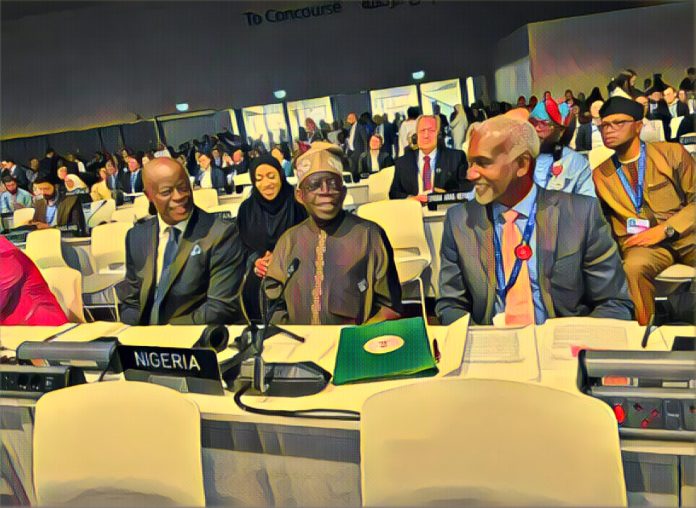Nigeria, a country that contributes only 0.319 percent of global carbon dioxide emissions, has sent a whopping 1,411 delegates to the ongoing COP-28 climate summit in Dubai, United Arab Emirates. This number is joint third largest with China, after the host nation-UAE with 4,409 and Brazil with 3,081, according to the official list of participants.
The decision to send such a large delegation has sparked outrage and criticism from many Nigerians, who see it as a waste of scarce resources and a sign of misplaced priorities. Nigeria is currently facing multiple economic and social challenges, such as high inflation, unemployment, poverty, insecurity, and poor infrastructure. Many Nigerians have taken to social media to express their dissatisfaction and demand accountability from their leaders.
According to Vanguard’s report, some of the critics include prominent civil society groups, such as the Socio-Economic Rights and Accountability Project (SERAP), which has filed a lawsuit against the federal government, seeking to compel it to disclose the names, designations, and costs of the delegates. SERAP argues that the public has the right to know how public funds are being spent and whether the delegation is serving the best interests of the country.
However, some experts and officials have defended the size of the delegation, saying that it reflects Nigeria’s commitment and leadership on climate action. They point out that Nigeria is one of the most vulnerable countries to the impacts of climate change, such as drought, flooding, desertification, and erosion. They also note that Nigeria has ambitious plans to reduce its greenhouse gas emissions by 20 percent by 2030 and achieve net-zero emissions by 2060, as well as to adapt to the changing climate and build resilience.
According to the Minister of Environment, Dr. Muhammad Mahmood Abubakar, who is leading the delegation, Nigeria is seeking to mobilize international support and resources to implement its climate goals and address its climate challenges. He said that Nigeria is also showcasing its achievements and initiatives on climate action, such as the Great Green Wall project, the National Afforestation Programme, the National Renewable Energy and Energy Efficiency Policy, and the National Gas Expansion Programme.
The COP-28 summit, which is taking place from November 30 to December 12, 2023, is a crucial opportunity for the world to accelerate and enhance its efforts to tackle the climate crisis and limit global warming to 1.5 degrees Celsius above pre-industrial levels, as agreed in the 2015 Paris Agreement. The summit is expected to produce a set of decisions and outcomes on key issues, such as emissions reduction, adaptation, finance, technology, and transparency.
The outcome of the summit will have significant implications for Nigeria and other developing countries, which are bearing the brunt of the climate crisis, despite contributing the least to it. Therefore, Nigeria’s participation and representation at the summit is vital to ensure that its voice and interests are heard and protected in the global climate negotiations.



